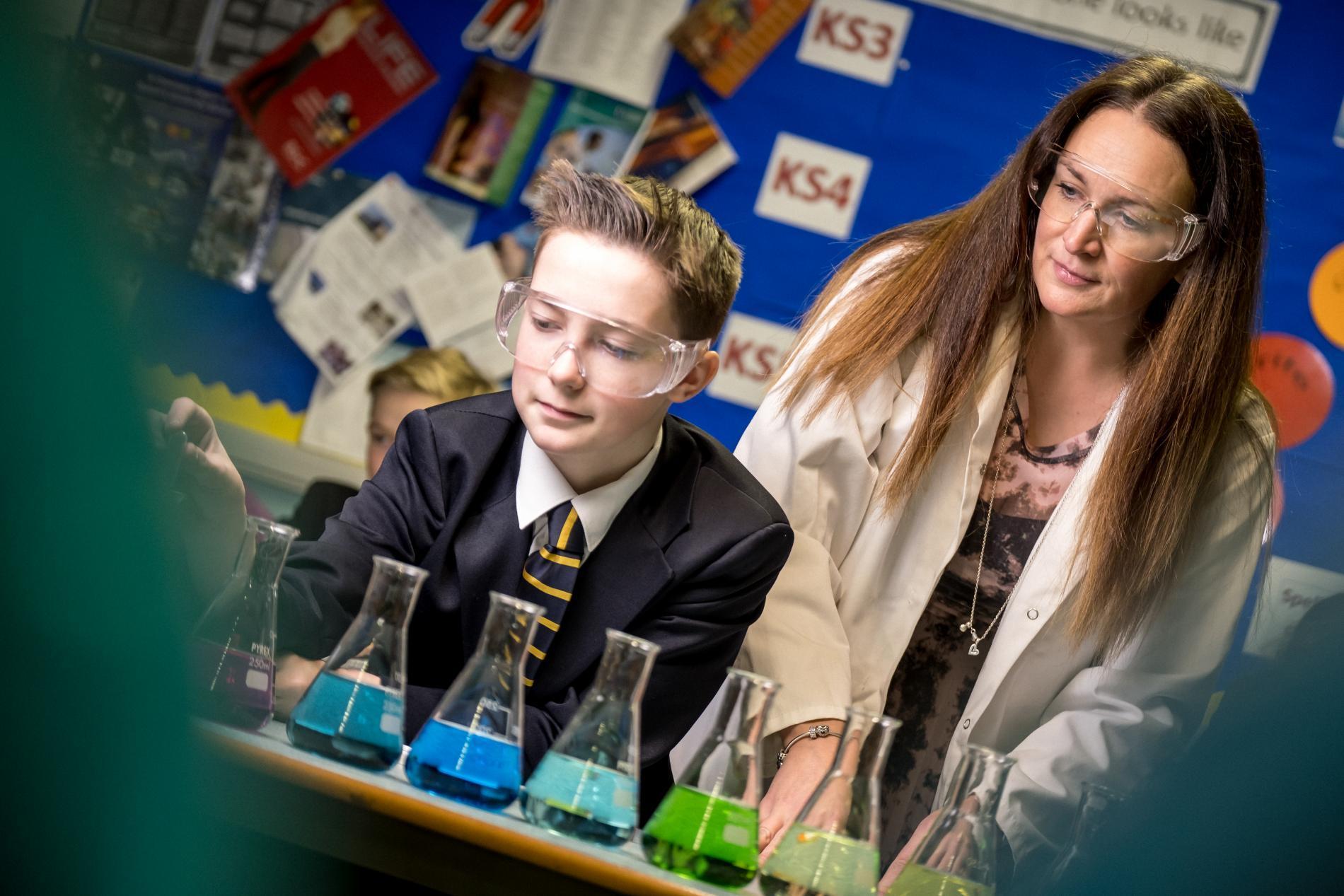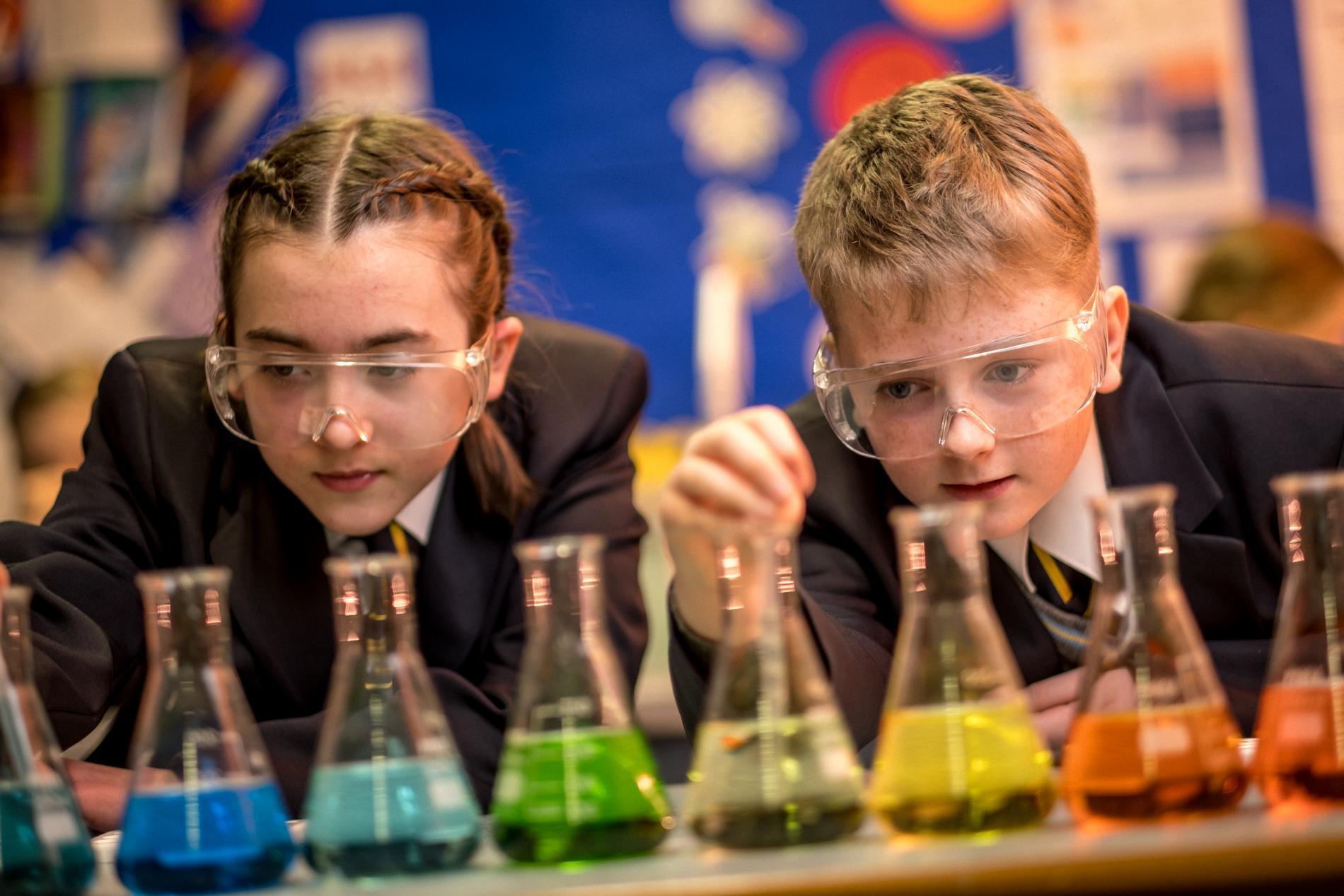Chemistry
Chemistry begins in the stars. The stars are the source of the chemical elements, which are the building blocks of matter and the core of our subject. Peter Atkins
 |
 |
Chemistry is the study of the composition, behaviour and properties of matter, and elements of the Earth and its atmosphere. From KS3 through to A level, students will learn about states of matter, the atom, the periodic table and the reactions of elements and compounds. They will develop their problem solving skills by applying their knowledge to real life Chemistry problems. They will become highly skilled at practical work through participation in the many experiments that is the foundation of this practical subject.
Key Stage 3
Pupils learn about the basics of atomic structure, elements and compounds, the periodic table and formula. This will form the foundation on which pupils begin to build their Chemistry knowledge. The Year 10 curriculum aims to ensure pupils become competent and confident in the application of basic Chemistry skills, such as making observations and problem solving, as well as equipping them with good practical technique which is both safe and precise. This is achieved through exposing pupils to a broad range of practical experiments and providing the opportunity for investigation and research.
GCSE
We follow the CCEA GCSE Chemistry and Double Award Chemistry courses and offer both options annually. These courses help pupils develop their problem solving, investigative and practical skills. The GCSE Double award course is a broad and coherent course that develops students’ knowledge and understanding of the material, physical and living worlds. Students develop their observational and problem-solving skills in the laboratory and during research beyond the course in areas such as Acid Rain and Global warming. They also enhance their ability to evaluate scientific claims through qualitative and quantitative analysis.
The GCSE Chemistry course provides a more in-depth study of the subject in areas such as Qualitative Chemistry, Solubility and Quantitative Chemistry. It helps students make sense of the world around us and connects to the main social, ethical and cultural issues affecting our lives today. It cultivates knowledge and understanding of the material world, the nature of science and the scientific process. It also teaches students how to be objective and how to reason and solve problems. Chemistry has close links with physics, biology and maths, providing a wide-reaching base of scientific knowledge that brings career opportunities in science, industry and commerce.
A Level
The CCEA GCE Chemistry specification encourages students to appreciate how society makes decisions about scientific issues and how chemistry contributes to the success of the economy and society. This specification is available at two levels: AS and A2. Students can take the AS units plus the A2 units for a full GCE A level qualification. They can also choose to take the AS course as a stand-alone qualification.
In the AS units, students build on their GCSE learning about physical and inorganic chemistry. They are also introduced to concepts in Organic Chemistry which includes reaction mechanisms. The course draws together different areas of knowledge, skills and understanding and how they relate to each other. Students carry out prescribed practicals that allow them to develop competence and ability in practical, mathematical and problem-solving skills.
Students who continue to A2 develop their AS knowledge and progress to studying higher level concepts, equipping them to learn about analytical chemistry, transition metals, electrochemistry and organic nitrogen chemistry. More complex practicals are incorporated into the A2 content, enabling students to develop higher order practical skills. They will develop and demonstrate a deep appreciation of scientific skills, and knowledge and understanding of how science works
The course at A level will develop the students interest in and enthusiasm for chemistry and increase their interest in the further study of chemistry and the careers associated with courses related to the subject.
Extra-curricular
Our pupils have enjoyed success in the Royal Society of Chemistry Analytical Competition hosted at Stranmillis College, having won the Northern Ireland heat in 2020. Annually, we compete in the Top of the Bench competition, where pupils in Years 10 to 12, have the opportunity to test their practical skills and scientific knowledge against their peers from other schools. We have attended The Royal Society of Chemistry ‘Careers in Chemistry’ exhibition, which showcases the possible career outcomes available to Chemistry graduates in Northern Ireland.
Where to next?
Pupils who have studied A level Chemistry have progressed to further study in areas such as : Engineering, Dentistry, Medicine, Biochemistry, Pharmacy, Archaeology and Finance. Most of our A Level pupils will progress to study either a Science, Engineering or Medical degree at top UK and Irish universities.